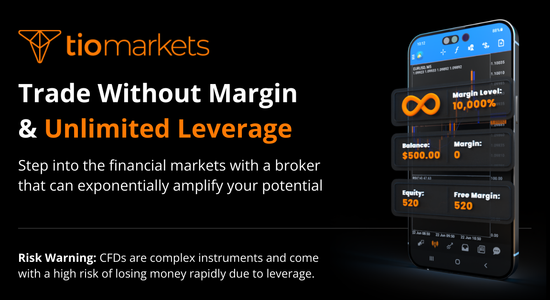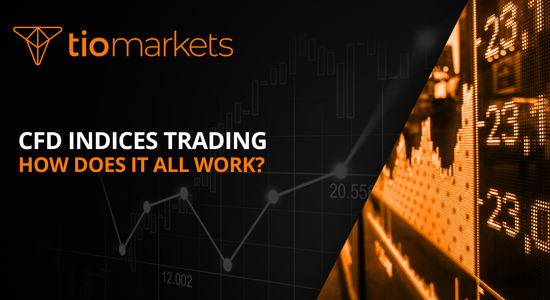Forex Vs Stocks: What Market Is Better To Trade?
BY Chris Andreou
|December 15, 2021Financial markets can be a crazy place; there are thousands of products and millions of people trading them.
One way to simplify things is to narrow your choice down and focus on fewer markets. So if you have already identified your preferences, like forex vs stocks, this one was written for you.
In this article, I’ll be comparing the similarities and differences between forex vs Stocks.
Then wrap things up with the pros and cons of trading each of them.
Trade forex and stocks with a reputable broker, take the next step and register your trading account today.
Forex vs stocks market comparison
The forex or stock markets are two markets often compared to one another, and there is a lot of information out there about them. Both involve trading but they can still be confusing, especially for new traders. Two common questions that often crop up are, what market should I trade? And, what market is better to trade?
To help you make an informed decision, we’ll discuss the similarities and key differences between these two markets.
You will have to consider your own personal situation before determining whether forex or stocks are better for you. But, I will make some suggestions at the end.
Let’s start with a quick overview.
What is Forex?
The forex market or foreign exchange market is the world’s largest and most liquid market. It is a global market made up by a network of banks for the trading in currencies.
Trading in currencies is like buying shares in a countries performance relative to another countries performance. It’s quite similar to the stock market in that, they both involve buying and selling assets.
Currencies measure purchasing power and value.
What is Stocks?
The stock market is a collection of markets or exchanges, where you can buy or sell shares of companies. Stocks are traded at listed exchanges and all the stock markets combined don’t even come close in comparison to the size of the forex market.
When you trade stocks, you are buying a share in a company, how the company performs will impact the value of your shares.
Stocks are somewhat similar to trading in currencies in that, a stock’s value is determined relative to the denomination currency. It’s either better to hold the stock or the money.
Trading in either market requires a broker as an intermediary to facilitate your orders to buy and sell.
What to know before you start trading in either market
There are some subtle differences, but the main difference between forex vs stocks, is that a stock represents an “ownership” stake in a company.
Currencies are simply a measurement of relative value.
With that being said, this is where things start becoming noticeably different. For a trader who is just starting out, it’s important to have as much information about these markets as possible.
Here is a quick primer.
Forex vs stock market hours
Both markets have set hours during which traders can buy and sell. One of the most noticeable differences with the forex market vs the stock market is that the forex market is open 24 hours a day, five days a week. This gives you the flexibility to trade at any time.
On the other hand, stock trading on exchanges is done during specific hours, usually during the business day from the morning to until the late afternoon. Trading times will vary between stock exchanges and their country of origin. So stocks don’t give you quite as much flexibility as forex does.
Market type
Forex trading is done over the counter (OTC) and it’s a decentralized market, while stock trading is done through a centralized exchange.
The forex market is made up from a global network of banks, updating currency quotes between themselves. These banks act as market makers setting prices that traders can either accept or reject.
When it comes to the stock market, all orders pass through a single venue. Stock traders trade directly with each other and their orders have a real impact on supply and demand, which directly affects the price.
Factors that affect each market
Anyone who has ever exchanged money knows how tricky it can be. The value of a currency depends on many factors, including economic performance and political stability. Traders monitor things like interest rates, gross domestic product, and employment and inflation data.
For the price of stocks, there are some similarities with forex in the economic overlap. If the economy is good and unemployment is low, people have more money to spend on products and services. This can mean more sales and more profits for companies boosting the company’s share price.
Stock traders also look at company’s news, balance sheets and cash flow forecasts to make their trading or investing decisions. While forex traders look at economic data, then make their trading decisions based on the relative strength or weakness of a country’s economy.
What are the main similarities between forex and stocks?
Why should you choose between trading forex and stocks? They’re both risky, right? You could have guessed that I’m going to say forex trading is the same as trading stocks, and they are up to a point. Let me explain the relationship between them, which makes them similar.
In the main, this is the extent of their similarity.
They have symbols
All stocks have something in common with currency pairs and it’s called a ticker symbol. A ticker symbol allows a trader to identify and track the stock or currency pair, which they may be interested in.
For stocks, the code usually consists of three letters but for currency pairs, it is six, three for the first currency and three for the second one. While all currency pairs are composed of six letters, the symbol of an individual currency is just three characters.
They have spreads
A spread is the difference between the buying price and the selling price of financial instruments. Spreads exist in the forex and stock market and the more liquid an asset is, the tighter the spread.
Since forex is more liquid than stocks, the spreads are tighter in forex so the price doesn’t need to move as far for trades to reach a break-even price when trading.
You can trade with leverage
Simply put, leverage allows you to buy assets of a much larger amount than the money in your trading account. Using leverage when trading can speed up potential profits, as well as losses.
It’s not uncommon to get 50 to 1 leverage in forex, sometimes much more depending on the broker’s jurisdiction and the regulatory framework. However for stocks, leverage is typically around 5 to 1.
Forex has much higher leverage than stocks because the amounts involved in Forex trading are much larger compared to your average company’s share price.
You can go long and short
Going long means you buy an asset expecting its price to rise. The opposite of this is going short, which simply means taking a trade expecting a decline in the price of the asset.
You can benefit from trading in both directions in the forex and stock market.
You can also trade long and short at the same time in the same stock or currency pair on TIOmarkets trading platform. This is known as hedging.
What are the major differences between forex and stocks?
On the surface, there appear to be a lot of similarities between forex vs stocks. However, if you are new to trading, you will discover there are significant differences between these two markets, especially when it comes to determining the pricing
They both trade in currency which is what makes them similar. Each transaction involves a person wanting to buy or sell, and a broker willing to fulfil this transaction.
However, there are more distinctions that can help you evaluate if one of these markets would work better for you than the other.
Range of instruments
One major difference between trading forex and stocks is the number of instruments available to trade. Stocks are traded in the form of shares, and there are thousands of companies to choose from. In forex trading, currencies are traded in pairs and there are fewer instruments to choose from.
Liquidity
The primary difference between trading Forex vs stocks is in the liquidity of each market. Stocks are liquid markets, meaning you can buy and sell them with ease, any time during market hours. Forex on the other hand is far more liquid, and you can get in and out of the market at practically any time.
You are less likely to experience price gaps and slippage when trading forex compared stocks.
Volatility
Forex and stocks are at opposite ends of the spectrum, when it comes to volatility and price movements. Forex is much more volatile than stocks, and offers the potential for larger profits (and loss).
Stocks tend to be less volatile, particularly for the high cap companies. Although you will be able to buy and sell with ease, their prices tend to be more stable. So it can take longer for the price of these stocks to make a significant move. On the other hand, the less liquid stocks can be very volatile but maybe not as easy to buy and sell the shares.
There are also currency pairs that are not that volatile but generally speaking, currencies move more on an average day than stocks do.
Pricing
The biggest difference between forex compared with stocks is how they’re priced. Stocks are priced based on supply and demand in the marketplace, so if more people want to buy than sell, the price should go up. If more people want to sell than buy, the price should go down.
Forex is different; currencies are priced based on relative value. A currency in forex trading is only worth something when converted into another currency, so its value only matters when compared to other currencies.
The main difference between forex vs stocks is that with stocks, you are buying a share in a company. While with forex trading, you are buying or selling units or lots of currency with a relative value to the other currency involved in the exchange.
Accessibility
Another key difference is how they’re traded. With forex, you’re trading from 1,000 units of currency. While with stocks, you can trade from one share.
Both markets are very easily accessible but there might be some limitations depending on the broker, your country of residence and the price of the stocks.
Although there are thousands of stocks, few brokers provide accessibility to such a vast array of instruments. Then when you do find them, there might be exchange and data fees involved.
The pros of trading forex
The largest advantage that forex has over the stock market is that you don’t need a lot of money to start trading. For instance, you can start with TIOmarkets from just $50. This is much smaller than what other investments or brokers will require from you. Maybe this is one of the reasons why forex trading is so popular.
It’s also the most liquid market in the world, which means the bid-ask spread is typically just a fraction of a pip. Spreads and transaction fees are ultra-competitive; you can start from 0.2 pips spread and $0 in commission on the VIP Black account.
Forex Trading platforms provide live data, charts, and indicators without any additional fees. Forex traders also have easy access to tools that give them the ability to do technical and fundamental analysis.
There are also fewer currency pairs to focus on, and you can trade at practically any time. So it’s easier to keep track of the market and find trading opportunities.
The pros of trading stocks
The stock market is highly regarded as a great investment opportunity, but is it really better than forex? To begin with, foreign exchange rates can be more volatile than stocks. Add higher amounts of leverage and a lack of experience in to the mix and you potentially have a recipe to lose money faster.
Stocks are generally slower and steadier so you can expect less volatility in your portfolio.
The stock market is also centralized; volume data is available in addition to all the other features available for trading forex. This can give you insight in to the supply and demand of a stock, to help make better informed decisions.
With stocks, you can buy shares and support the brands that you like. For example, if you like Coca Cola, you can buy shares of the company. Compared to the forex market, there are thousands of companies to choose from so there are lots of trading opportunities.
Try trading forex and stocks
Have you decided what market to trade, forex or stock?
Try trading both on a demo or live account.
Open an account with a reputable broker today.
Risk disclaimer: CFDs are complex instruments and come with a high risk of losing money rapidly due to leverage. You should consider whether you understand how CFDs work and whether you can afford to take the high risk of losing your money. Never deposit more than you are prepared to lose. Professional client’s losses can exceed their deposit. Please see our risk warning policy and seek independent professional advice if you do not fully understand. This information is not directed or intended for distribution to or use by residents of certain countries/jurisdictions including, but not limited to, USA & OFAC. The Company holds the right to alter the aforementioned list of countries at its own discretion.

Experienced independent trader
Related Posts
Trade responsibly: CFDs are complex instruments and come with a high risk of losing all your invested capital due to leverage.



